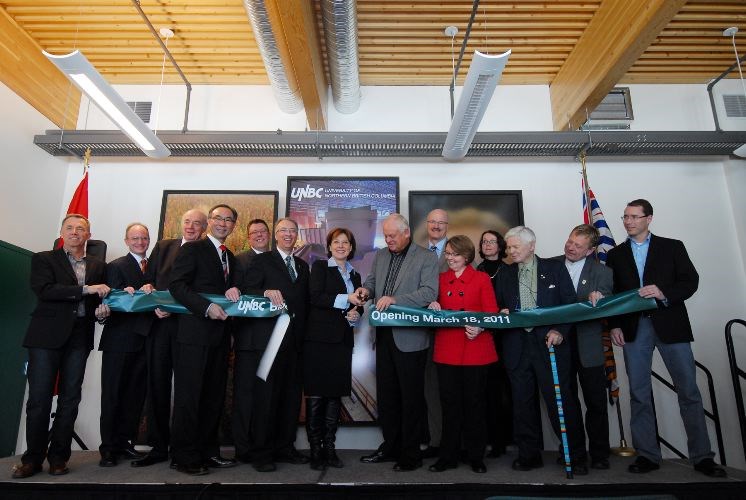After only 96 hours as B.C.'s premier, Christy Clark travelled to Prince George today to cut the ribbon on an innovative bioenergy plant at the University of Northern British Columbia.
UNBC is the first university in Canada to use bioenergy from waste wood products to heat campus buildings, and Clark joined MP Dick Harris, university president George Iwama and MLAs Shirley Bond and Pat Bell, among other dignitaries, to celebrate the official opening of its new plant.
The plant, which uses innovative technology to convert bark, branches, sawdust and leftover wood products from nearby mills into a highly efficient means of heating campus buildings, is expected to reduce greenhouse gas emissions at the university by 3,500 to 4,000 tonnes annually.
That is the equivalent of taking 1,000 cars off the road every year.
"Partnerships like the one between UNBC and Nexterra showcase not only B.C.'s ability to demonstrate leadership in innovation in the clean energy and technology space, but also support our greater goals of driving strong economic growth and job creation around the province," stated Clark in a press release.
"From local employment opportunities in manufacturing, construction and ongoing fuel supply, these are the types of projects that will secure B.C.'s future for the long term."
The heating plant is a component of the university's bioenergy program plan to help meet its current and future energy needs, as well as contributing to research and development, training, education and the development of bioenergy projects and demonstration opportunities for northern communities.
"This is an important development for UNBC, but it's also very important for the local forest industry and the 621 communities across Canada that are reliant on forests," stated Iwama in the release.
"This facility is a showpiece that will serve as a unique platform for education and research. Biomass is a sustainable, renewable energy source that is critical to the diversification of the forest industry and the communities that rely on it."
UNBC received $15.7 million from the federal and provincial governments for its biomass gasification system, and $5 million from both governments for upgrades to campus heating equipment.
This project is part of the federal government's two-year, $2-billion plan to repair and expand research and educational facilities at Canadian post-secondary institutions. It was among 39 projects at post-secondary institutions across the province to receive funding from the Knowledge Infrastructure Program.
"This project will allow UNBC to strengthen its capacity and build on its reputation as a leading institution of higher learning," stated Harris in the release.
IN BRIEF
* The plant is expected to use 8,000 tonnes of waste wood per year.
* Biofuel will replace 85 per cent of the university's natural gas use.
* Switching from natural gas to wood waste is expected to save UNBC more than $500,000 a year in fuel costs.
* UNBC began their bioenergy program as a way to help local industry diversify their activities after the pine beetle infestation.
* The bioenergy plant was built to LEED (Leadership in Energy and Environmental Design) gold standard.
* The bioenergy plant represents completion of the first of three phases in UNBC's Northern Forest Product and Bioenergy Innovation Centre project.
* UNBC is working with governments, communities, the private sector, First Nations, and educational partners to develop local solutions to by integrating campus operations, education, and research on a single site.
* UNBC recently won a top award for campus sustainability projects in North America - an honour it shared with Harvard University. The Association for the Advancement of Sustainability in Higher Education selected the university's bioenergy project for its ability to connect teaching and research to campus operations, while acting as a model for communities and other campuses.



